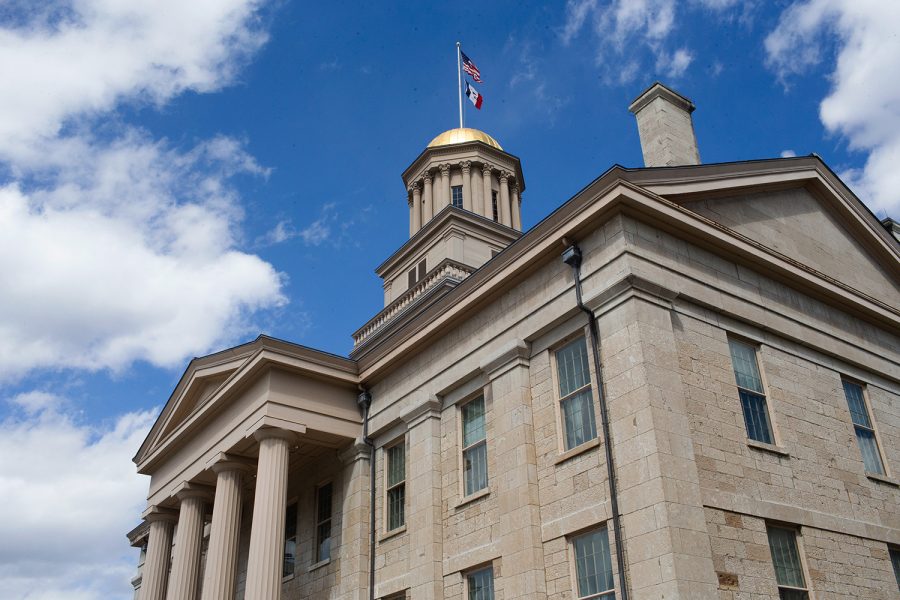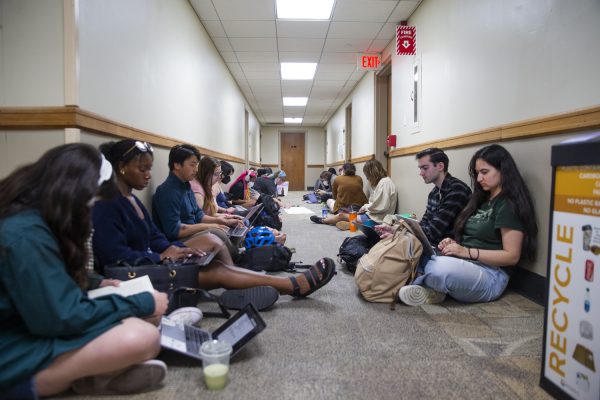UI faculty senate, state Board of Regents oppose anti-tenure bill
The bill, introduced in the Iowa House of Representatives on Jan. 17, would prohibit all tenure policies at the regent universities.
The Old Capitol Building is seen in Iowa City, Iowa on April 14, 2022.
January 24, 2023
A bill designed to prohibit tenure policies and contracts is facing opposition from members of the University of Iowa and at state Board of Regents-governed universities.
The bill, House File 48, was introduced by Rep. Steven Holt, R-Denison, on Jan. 17 in the Iowa House of Representatives and would impact contracts made after July 1. It is similar to bills introduced in the legislature in past years that did not pass, including in 2021 and 2019.
If enacted, the bill would prohibit tenure for any employee at the university and lists acceptable grounds for termination of employment of any faculty member as just cause, program discontinuance, and financial exigency.
The bill would also require the regents to establish a program that would create “faculty opportunities for women educators at the universities under the board’s control.”
“The program shall include but is not limited to the creation of faculty positions in targeted shortage areas,” the bill states. “The Board of Regents shall also develop and implement, in consultation with appropriate faculty representatives, tenure, promotion, and hiring policies that recognize the unique needs of faculty members who are principal caregivers to dependents.”
Despite the control the regents would have in the fruition of the bill, Josh Lehman, senior communications director of the regents, wrote in an email to The Daily Iowan that the group does not support the bill.
“The Board of Regents opposes this bill. Tenure allows our institutions to recruit and retain the best faculty to teach, do research, and provide service to advance the institutional missions of Iowa’s public universities,” he wrote.
Additionally, Lehman wrote that the current programs at the regent universities are accomplishing goals described by the bill.
“Our institutions have rigorous accountability procedures in place and conduct annual reviews of faculty at all levels, including tenured faculty. These reviews ensure that all faculty members continue to work hard and perform well,” he wrote.
Ana Rodriguez-Rodriguez, UI Faculty Senate President, agreed with Lehman, stating in an email to The Daily Iowan that tenure is essential to not only strengthening faculty but students’ learning as well.
“Academic freedom, the free exploration, and expression of ideas are essential to discovery. And the core purpose of tenure is supporting and safeguarding that freedom,” she wrote. “This freedom is indispensable to our mission of contributing to the common good through our research, scholarship, and creative endeavor, and to ensuring our students’ freedom to learn.”
The UI College of Liberal Arts and Sciences recorded 552 tenure track faculty members employed in 2022. One is Loren Glass, chair of the UI’s English department and member of the American Association of University Professors UI chapter.
Glass said tenure was invented by the American Association of University Professors to protect academic freedom and is the basis of university-level teaching. It is not to ensure professors have permanent jobs.
“Tenure was established to ensure that we can do our jobs. In other words, to ensure that we have the academic freedom to teach without interference and to do our research without political interference,” he said. “We still can be fired. The only thing that tenure means is that there’s no end date for our contract.”
Like the bills proposed before House File 48, Glass said he expects the bill will not be made into law because if tenure is ended, it will harm the regent universities’ ability to recruit and retain faculty and students and the state.
“The university is a great economic driver for the state in which you wouldn’t just be hurting the university if you eliminated tenure, you would be hurting the entire state economy,” Glass said. “You would lose all sorts of investments and labor and resources if you destroyed your university system like that.”
Glass said tenure is necessary for the university to remain strong, as it allows professors to teach what they are experts on.
“Without academic freedom, you can’t have a well-functioning, reputable university system, and so this is an attack on our core values, not on some fringe benefit that we get, but goes very much to the heart of what university faculty do and how their careers are structured,” he said.















